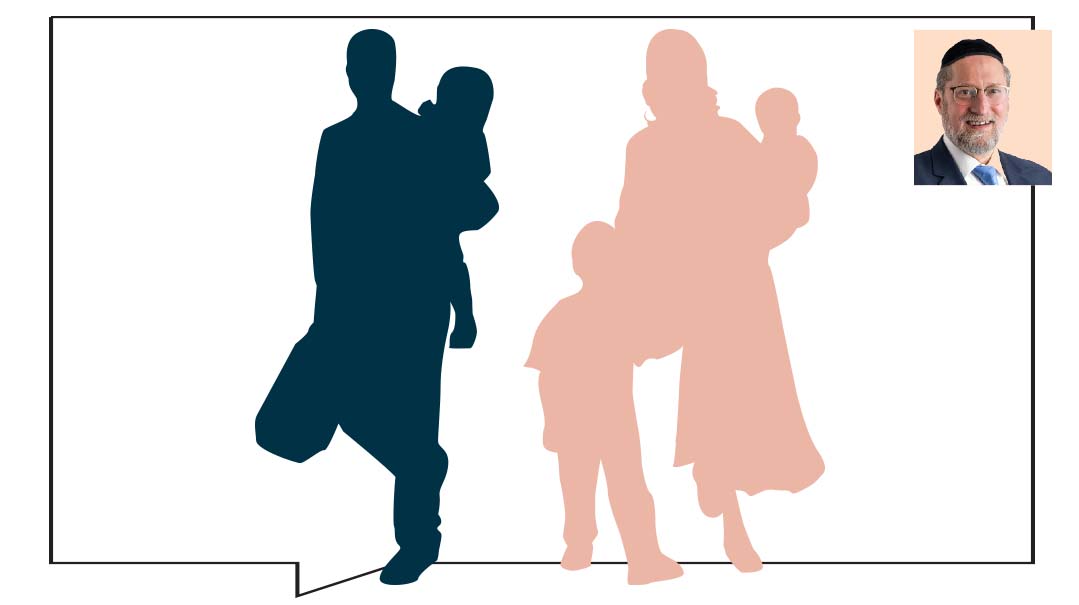“How Do I Become Blind to My Spouse’s Flaws?”
| December 7, 2021Your spouse might be flawed, but you also have stuff

Written with Zivia Reischer
Rabbi Shafier,
I just read your column and really liked the sound of your advice. Be blind, deaf, and dumb to your spouse’s flaws. Don’t notice them, don’t point them out.
It sounds great. Utopian. But…
How do you do that in real life?
Can we get some practical tips? How does one become blind? It’s one thing to notice a flaw or mistake and then refrain from pointing it out. But I don’t think that’s what you meant. You meant that we should reach a point where we don’t notice the issues at all. How do you get there? In my experience, it doesn’t seem possible.
Can you teach me how to stop seeing the flaws in the first place?
I have a mussar exercise that I believe can solve this great challenge, if you are willing to do the work. I call it work because it isn’t going to be easy.
If you would like to have a better marriage, and if you are serious about self-improvement in general, I want you to walk up to a mirror, look at the face staring back at you, and say these words aloud three times: “I am a difficult person to live with.”
I am a difficult person to live with.
I am a difficult person to live with.
I am a difficult person to live with.
I, not my spouse, am a difficult person to live with.
As you say those words, a voice might well up inside you. No. That’s not true. It’s my spouse that’s the problem.
Well, your spouse might be flawed, but you also have stuff. Every human being has quirks, idiosyncrasies, shortcomings, and flaws. We’re either too late or too punctual, too sloppy or too neat, too uptight or too chilled.
I guarantee that you’re a difficult person to live with. How can I guarantee it? Because Hashem created you imperfect and put you on the planet to perfect yourself. (If you were perfect, you wouldn’t be here. Your job would be done, and it would be time to leave. So let’s hope that I’m right and you’re not perfect.) You, like every other person on the planet, have habits, tendencies, and weaknesses that need improvement — which means you are difficult to live with.
That doesn’t mean you’re an obnoxious person. It means you’re human. Every human being, no matter how put-together, no matter how good their middos, has certain qualities or tendencies that make it difficult for another human being to live with them.
The reason that you don’t see yourself that way is because people have a basic instinct of self-protection; we can’t help but be kind to ourselves. The problem is that we don’t apply that standard to everyone else.
When you actually do this exercise and look in the mirror, for a rare moment you can see yourself honestly. While you have many strengths and talents, you also have things you need to work on. When your focus is fixing your own flaws, and when your attention is zeroed in on your own issues, you’re no longer in that mode of noticing your spouse’s imperfections. They become a background issue that is not worth your time or attention, because you’re busy working on yourself.
It’s helpful to understand one of the distinctions between infatuation and love. Infatuation blinds; love binds. When you’re newly married and infatuated, you don’t see any flaws — because the newness of the situation and the temporary euphoria of infatuation blind you from seeing anything wrong with your spouse. He’s perfect.
When the infatuation wears off, you suddenly notice your spouse’s very real flaws. Within a short time they become prominent and glaring. Pretty soon you can’t help but see them everywhere you look. And if you become hyper-focused on them, then this dynamic can prevent the development of a loving connection that would allow you to accept your spouse despite the flaws.
The solution is to recognize that I, too, have flaws, and just as I accept myself, flaws and all — so too do I accept my spouse. Practically speaking, this means that every time I notice a flaw of my spouse, I consciously turn my focus away and remind myself that I, too, am a work in progress. Eventually I reach the point where I’m aware that just like me, my spouse has shortcomings — and I accept and love them with that full knowledge.
(Originally featured in Mishpacha, Issue 889)
Oops! We could not locate your form.







